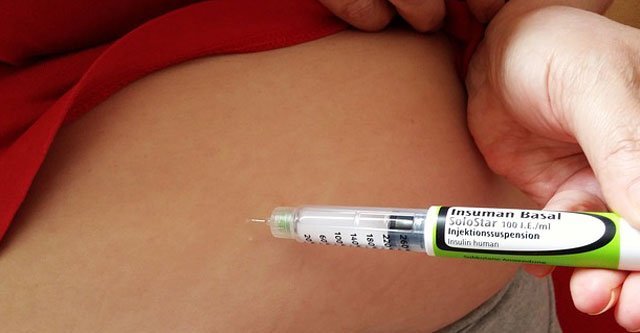Last Updated on July 3, 2021 by Dr Sharon Baisil MD
A lot of times, insulin intakes and injections can be missed due to various reasons. You may have forgotten to take your daily insulin before a meal, overslept, maybe you did not have your insulin injecting kit with you; maybe you ran out of insulin, the insulin pen won’t work, etc.
It can be harmful and risky for your body to miss an insulin dose. Ensure that you do not skip an insulin dose, and not deliberately as it can have adverse effects on the body’s blood sugar level.
Missing on insulin before a meal can result in a rise in the blood sugar levels. Not only blood sugars, but the ketone levels of the body can also be affected to rise, causing a condition called ketoacidosis.
The spikes in sugar levels of the blood cannot be handled well by the insulin that the body is producing. Thus, it can result in conditions of hyperglycemia, that is, higher levels of glucose in the blood than normal.
Such a situation causes the following symptoms:
– Increase in thirst
– Nausea and vomiting
– Increased heart rate
– Confusion, Apathy, and drowsiness
– Frequent urination
– Blurriness in vision
– Dry skin
– Loss of appetite
There is a certain specified time limit within which you can administer the insulin into your body even if you have already had a meal but forgotten to take the insulin before the meal.
Although not recommended, taking insulin after food is not recommended because as soon as you begin eating, the blood sugar in your body starts to rise. If the insulin is taken beforehand, before 15 – 30mins before a meal, it will go into your body and start functioning accordingly.
The injected insulin helps create a good supply of this hormone that later maintains the addition of glucose that piles up while eating.
Insulin is taken before the meal will act and help eliminate any sharp and harmful spikes in your blood sugar levels, preventing hyperglycemia.
When insulin is taken after food, it goes into your system and starts acting later. If taken within the general limit allowed for post-meal insulin, it can still be useful in correcting the missed insulin’s function.
At times, if insulin is taken after a meal, it can raise a chance of hypoglycemia. Hypoglycemia is a condition where blood sugar levels can go lower than usual and be harmful to the body.
Hypoglycemia is caused due to post-meal insulin because, by the time you inject your insulin, the food eaten will have already started to affect your blood sugar, causing a raise.
By the time the insulin taken after the meal kicks in, the kidneys would already have started to function and filter the blood to bring the sugar levels back down.
On top of that, the additional insulin taken post-meal can affect the glucose to fall further down, leading to a hypoglycemic episode.
Thus it is always advisable to follow your insulin injection time as prescribed by the diabetic health team depending on the type of insulin you have been appointed to.
If any casualties are caused, and impacts noticed, it is always safer to report this to your doctor.
When should one normally take insulin in a day?

Insulin must be taken before meals, as when you are eating, the blood sugar levels in your body tend to rise naturally. Injecting insulin before this spike in blood sugar can happen helps to manage the rise in sugar levels.
Mealtime Insulins are the ones that are taken immediately before a meal and are fast-acting ones.
Regular insulin should be injected before 15 to 30 minutes of a meal. There are various insulin injections available whose time intervals depend on the strength of it. Various brands are made to work comparatively quickly. These insulin injections must be taken less than 15 minutes before a meal.
It is generally advised and recommended by doctors to administer insulin in the body before meals.
What to do if you forgot your daily insulin before food? Can it be taken afterward?
Now, let’s say, you missed to take your insulin before your food, it is not very late to correct this mishap. Suppose insulin is introduced to the body within specified time limits after meals. In that case, it can still work the same way and protect your metabolism and blood sugar levels from adverse situations.
Thus, the question arises, that if you have not taken your daily insulin before a meal, can it be taken after you have had your food?
Let us divide the way insulin can be taken post-meal, depending on the varieties of insulin available and might be the ones you use.
Short-term acting OR Rapid-acting Insulin

These are common insulin types that are given to diabetic patients to administer in the body before 30 – 60 minutes of a meal. Depending on the strength and type of these Insulins, you can even take them within 15 minutes before a meal.
If you realize that you have skipped this insulin injection before having a meal, it is best to take it within one to two hours after the meal.
It is best to check your sugar levels after a meal, see how the glucose is rising and then consult your diabetic health team or your doctor to suggest the correct precaution.
If you take the insulin within two hours of a meal, you should keep in mind that it will start working accordingly later.
To avoid any causalities, be vigilant, and test your blood sugar more frequently than usual.
If you notice any discomfort or unusual rise or fall after taking the post-meal insulin, directly contact your health team and consult their advice.
Long-term acting/ Basal Insulin
Long-term acting Insulins are usually taken on a broader window. This is usually injected in the morning and works on for a longer part of the day.
If you acknowledge that you have missed your morning insulin at the regular morning hour, you can take it within a 2 hour time from the usual time.
Assure that the next dose of insulin you take, after taking this type of insulin in a later period is at an 8 – 10-hour gap from the previous one.
Be aware of the following insulin actions to be felt as you took the insulin at a later point that it was scheduled. This can sometimes lead to lower than usual blood sugar levels and have a risk of causing hypoglycemia.
Thus, it is best to monitor your blood sugar levels regularly, and if you notice discomfort or impacts, seek the help of your medical team.
If you realize it later that you have missed your usual long-term insulin dose, and it has already been two hours since then, it can be very harmful.
Without any further delaying, contact your doctor or health team and consult their remedy.
Often, to correct this mishap, doctors even suggest taking short-acting or rapid-acting insulin to cover the missing out on the long-term ones.
Before using any other remedy, be sure to ask your doctors first.
Mixed or Intermediate-acting Insulin
These are not conventional Insulins and are usually made to combine with a short-term acting insulin dose. The dosage of intermediate-acting insulin depends on the other insulin that it has to be combined with.
If this insulin is not taken on the time it should have been, then the general rule of taking the regular dose within the next two hours can be followed.
As the insulin was taken post scheduled time, thus, it would affect the following way as well. Between this, if there is any discomfort felt, or any high rises or falls noticed in the blood sugar levels, then you should check with your doctors to be on the safer side.
Be aware and monitor your sugar and ketone levels from time to time, and record if any symptoms appear.
These untimely Insulins can impact the blood sugar levels and, in turn, cause hyperglycemia or hypoglycemia.
A word of Caution
Before you take the insulin dose after a meal because you missed your pre-food insulin injection, make sure that you have missed your insulin. In any case, avoid this confusion, as an extra dose can be problematic.
Extra insulin can lower the levels of blood sugar below the normal range, which can be harmful to the body.
This is an obvious confusion and can happen to anyone. Thus, make sure you follow a correct routine and, if forgetful about watching your insulin intake, better fix reminders and alarms to remind you about your upcoming doses.
To stay on the safer side, always ensure you take your insulin before your meals and in specified dosages.
If any problems are noticed in the blood sugar levels or any impactful symptoms in the body, always immediately reach out to your doctor.
References:
- https://pubmed.ncbi.nlm.nih.gov/30871141/
- https://pubmed.ncbi.nlm.nih.gov/18509207/
- https://pubmed.ncbi.nlm.nih.gov/23521532/
- https://pubmed.ncbi.nlm.nih.gov/25352633/
- https://pubmed.ncbi.nlm.nih.gov/27872168/
- https://pubmed.ncbi.nlm.nih.gov/18158076/
- https://pubmed.ncbi.nlm.nih.gov/29873107/
- https://pubmed.ncbi.nlm.nih.gov/20144286/
- https://pubmed.ncbi.nlm.nih.gov/26257323/
- https://pubmed.ncbi.nlm.nih.gov/31126048/
- https://pubmed.ncbi.nlm.nih.gov/23259764/
- https://pubmed.ncbi.nlm.nih.gov/25733632/
- https://pubmed.ncbi.nlm.nih.gov/29596514/
- https://pubmed.ncbi.nlm.nih.gov/9356547/





